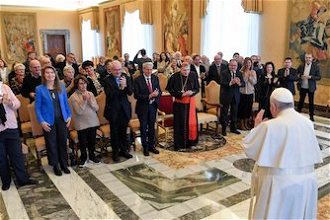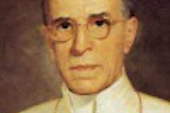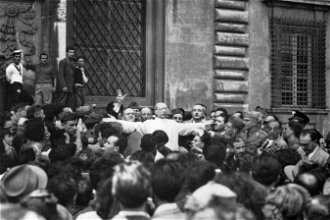Hungarian Bible scholar visits UK to commemorate Pius XII encyclical

Seventy-five years ago this year, in the middle of the Second World War, Pope Pius XII published an Encyclical Letter on the Bible. Entitled Divino Afflante Spiritu, the letter was promulgated on 30th September 1943, on the feast of Bible translator St Jerome.
Hungarian Bible scholar and member of the Pontifical Biblical Commission, Fr Levente Martos Balazs, visited the UK recently to mark this significant anniversary.
Fr Levente's main engagement was as keynote speaker at 'Light in our Darkness', an event organised by the Catholic Bishops' Conference, Heythrop College and Bible Society to commemorate the anniversary. Fr Levente considered the contents and impact of the encyclical, which is often referred to as the 'magna carta' of biblical studies in the Catholic Church.
Pope Pius looked back at the initiatives taken by earlier popes. He also described the tragic circumstances of the Second World War which provide the setting for this document of hope. A couple of months before the encyclical was issued Rome had been bombed by the Allies, provoking a courageous intervention of the pope when he visited the devastated area of San Lorenzo. Just weeks after the encyclical appeared Pius intervened with the German authorities to bring to a halt the arrest of the Jews of Rome. He also gave instructions for churches, convents and other institutions to offer refuge to all those in need.
Fr Levente addressed the main topic considered by Pope Pius in the encyclical: the use by Catholic scholars of modern methods of biblical study. Pius records the impact of the discoveries emerging from excavations in the Bible lands. He encourages the meticulous study of the biblical languages, it being 'the duty of the exegete to lay hold, so to speak, with the greatest care and reverence, of the very least expressions which have flowed from the pen of the sacred writer'.
From the discovery of the literal sense of a passage of scripture its theological value must then be sought. Fr Levente describes as 'the greatest novelty of the encyclical letter' the teaching of the pope regarding the literary genres of scripture. The scholar must seek to discover what kind of writing and what forms of expression are being used. This is essential for an accurate interpretation of the text. God makes use of the human writer, who naturally uses the ways of writing common in his own day.
Pius XII admits that the difficulties of some passages may remain insurmountable, and confirms the need for ongoing research. The encyclical shows honesty and realism in its assessment of the state of biblical studies. Pius would have been informed of these developments by Fr Augustinus Bea SJ, his confessor, who was also the rector of the Pontifical Biblical Institute, and an expert on interpretation of the Bible.
Fr Levente concluded by looking at the impact and 'after-life' of the encyclical. Scholars who had lived in fear of censure for decades were finally permitted to pursue their investigations without anxiety. The research into literary genres opened up many questions, and would allow biblical scholars to consider honestly the question of the truth of scripture and in particular the historical features of the Bible.
The impact of the encyclical was immense, and it sowed many seeds which would bear fruit in its most illustrious successor, the dogmatic constitution of the Second Vatican Council, Dei Verbum. Many points made by Pius in the encyclical can be detected in the work of the Council, and in some cases they are taken further.
Before returning to Hungary Fr Levente led a study day at the parish of Christ the Eternal High Priest in Gidea Park on 'Catholics and the Bible'. This event marked at a more pastoral level the debt we all owe to Pius XII.
Fr Adrian Graffy, parish priest of Gidea Park and colleague of Fr Levente on the Pontifical Biblical Commission, said: 'I am particularly grateful to Fr Levente for coming over to help us with his insightful presentation of the contribution of Pope Pius XII to the continuing discovery of the beauty of the Scriptures in the life of the Catholic Church.'
An abiding memory for many will be the final power-point slide used by Fr Levente in his presentation at Gidea Park. It showed a young boy learning to ride his bike, with his father running behind the bike to make sure he was safe. This image from real life, Fr Levente suggested, could powerfully evoke the care of God in ensuring that we human beings would be able to understand the word of God. Pius XII indeed spoke of God 'coming down to our level' so that the words of God, expressed in human languages, would truly nourish our lives, filling us with faith and hope.


















